Persian poet, also known as “Parsi poet” or “Farsi poet,” has a rich and illustrious history spanning over a millennium. Persian poets have made significant contributions to the world of literature, creating profound and captivating works exploring themes such as love, spirituality, nature, and the human condition. Persian poetry has profoundly impacted Persian culture and the literary traditions of many other languages.
Stay with Iran Travel Guide Center to explore more about famous Persian Poets:
Classical Persian Poets
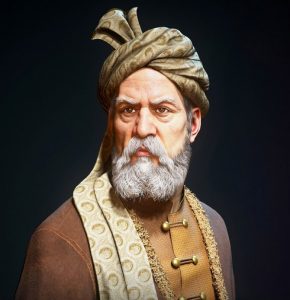
Ferdowsi, Persian Poet
Ferdowsi (935-1020)
He is known for his epic masterpiece, the Shahnameh (Book of Kings), which recounts ancient Persia’s mythical and historical tales.
Ferdowsi, whose full name was Abu’l-Qasim Firdawsi, is one of the most celebrated Persian poets and the author of the Shahnameh (Book of Kings). He was born in 935 CE in the city of Tus, located in present-day Iran. Ferdowsi lived during the Samanid Dynasty, a period characterized by a revival of Persian culture and a renewed interest in the Persian language.
Ferdowsi dedicated over three decades of his life to composing the Shahnameh. This epic poem spans 50,000 verses and narrates the history and mythology of ancient Persia from its mythical beginnings to the Arab conquest in the 7th century. The Shahnameh is considered Ferdowsi’s greatest masterpiece and a significant contribution to Persian literature and identity.
The Shahnameh consists of various stories and accounts of legendary and historical figures, including mythical heroes, legendary kings, and famous warriors. Ferdowsi drew inspiration from earlier Persian sources, oral traditions, and historical chronicles to create a comprehensive and captivating narrative. He aimed to revive and preserve the pre-Islamic Persian heritage and language, which were gradually being overshadowed by Arabic influences.
Its elegance and grandeur characterize Ferdowsi’s poetic style and the effective use of classical Persian meters, primarily the couplet form known as “Masnavi” and the quatrain form known as “ghazal.” His verses are rich in imagery, metaphors, and vivid descriptions of battles, love, heroism, and human virtues. The Shahnameh is a historical document that explores profound themes such as justice, loyalty, honor, and the eternal struggle between good and evil.
Ferdowsi faced many challenges during the creation of the Shahnameh, including financial difficulties and political instabilities. However, his unwavering dedication to preserving Persian culture and language motivated him. Upon completing the Shahnameh, Ferdowsi is said to have presented it to the Samanid ruler Mahmud of Ghazni, who initially promised a generous reward but ultimately failed to fulfill his promise. Ferdowsi’s epic poem gained immense popularity and became a cherished work of Persian literature.
Ferdowsi’s legacy extends beyond his literary contributions. He played a vital role in the development and standardization of the Persian language, as the Shahnameh helped establish classical Persian as a prestigious and refined literary language. His work influenced subsequent generations of poets and became a cornerstone of Persian cultural identity.
Ferdowsi’s impact on Persian literature and his contribution to preserving the Persian language earned him a prominent place in the hearts of Iranians. His dedication, perseverance, and passion for his cultural heritage make him an iconic figure in Persian history and literature, and he continues to be revered as one of the greatest poets in Persian literature.
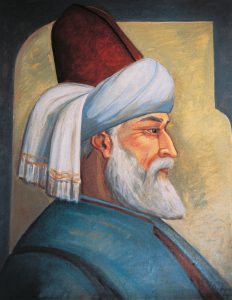
Rumi (1207-1273) famous Persian Poet
Rumi (1207-1273)
A renowned Sufi mystic and poet whose works, such as the Mathnawi, delve into themes of divine love, spiritual union, and the search for truth.
Rumi, also known as Jalal ad-Din Muhammad Rumi, was a 13th-century Persian poet, Islamic jurist, and theologian. He was born in Balkh, now part of Afghanistan, in 1207 CE and later settled in Konya, Anatolia (present-day Turkey). Rumi’s poetry is revered worldwide for its spiritual depth, profound wisdom, and timeless appeal.
Rumi’s life significantly changed when he met the wandering dervish and poet Shams Tabrizi in Konya. Their intense spiritual friendship had a transformative effect on Rumi, leading him to embrace the path of Sufism (Islamic mysticism) and embark on a journey of self-discovery and spiritual awakening.
Rumi’s poetic works are primarily collected in a massive volume known as the Mathnawi (or Masnavi), considered his greatest literary achievement. The Mathnawi comprises six books and over 25,000 verses composed in rhyming couplets. It explores many themes, including divine love, the quest for spiritual union, the nature of the soul, the mysteries of existence, and the search for truth.
Rumi’s poetry often employs rich symbolism, metaphors, and allegories to convey spiritual concepts and insights. His verses are characterized by their emotional intensity, mystical imagery, and longing for union with the divine. Rumi’s writings emphasize the power of human and divine love as a transformative force that can lead to spiritual awakening and liberation.
One of the most distinctive features of Rumi’s poetry is its universality. His verses transcend religious and cultural boundaries, speaking to the hearts of people from different backgrounds and beliefs. Rumi’s love, unity, and inner exploration message resonates with truth and spiritual seekers worldwide.
Rumi’s influence extends far beyond the realm of literature. His teachings and philosophy have profoundly impacted Islamic spirituality, particularly within the Sufi tradition. He founded the Mevlevi Order, commonly known as the Whirling Dervishes, who perform the Sema ritual, a spiritual practice that involves meditative whirling to reach a state of spiritual ecstasy and union with the divine.
Rumi’s poetry has been translated into numerous languages and continues to inspire and touch people’s hearts across cultures and generations. His work has influenced many worldwide artists, musicians, scholars, and spiritual seekers. Rumi’s enduring popularity and universal appeal make him one of history’s most widely read and beloved poets, leaving an indelible mark on poetry and spirituality.
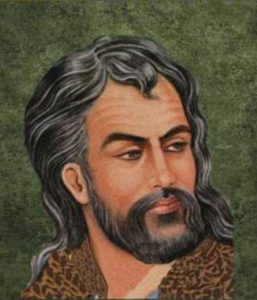
Hafez (1325-1390) famous for his lyrical poems
Hafez (1325-1390)
He is celebrated for his ghazals (lyrical poems) that explore themes of love, wine, spirituality, and the fickleness of fate.
Hafez, whose full name was Khwāja Shams-ud-Dīn Muhammad Hāfez-e Shīrāzī, is one of the most revered and beloved Persian poets. He was born in Shiraz, Iran, around the year 1325 and lived during the 14th century. Hafez’s poetry, filled with profound wisdom, mystical insights, and exquisite imagery, has profoundly impacted Persian literature and culture.
Hafez is best known for his ghazals, short lyrical poems composed of rhyming couplets. His ghazals explore themes of love, wine, spirituality, the search for divine truth, and the fleeting nature of life. Hafez’s verses often employ intricate wordplay, metaphors, and allusions, creating a rich tapestry of meaning and emotion.
What distinguishes Hafez’s poetry is its multi-layered nature. On the surface, his verses celebrate love, beauty, and the joys of life, often referencing the mystical concept of divine or spiritual love. However, beneath the surface, Hafez’s poems also carry deep philosophical and spiritual insights, addressing existential questions and the longing for union with the divine.
Hafez’s poetry is renowned for its mystical and Sufi elements. Sufism is a mystical branch of Islam that seeks inner spiritual experiences and union with the divine. Hafez’s verses often express themes of divine love, the yearning for spiritual connection, and the idea of the lover and the beloved as metaphors for the seeker and God.
Hafez’s works have been widely studied and interpreted, with his Divan (collection of poetry) being one of the most cherished and extensively translated works of Persian literature. His verses have been regarded as a source of spiritual guidance, and his Divan has become a staple in Persian households, where it is often consulted for advice or enjoyed for its aesthetic and spiritual qualities.
Hafez’s influence extends beyond Persian literature. His poetry has inspired numerous artists, writers, and thinkers throughout the centuries. His verses have been set to music and performed by various musicians, and his ideas have also influenced other literary traditions. Hafez’s impact on Persian culture is so significant that he is often called “Hafez-e Shirazi,” meaning “Hafez of Shiraz,” honoring his connection to his birthplace.
In Iran, the tradition of “fal-e Hafez” is prevalent, where individuals seek guidance or gain insight into their lives by randomly opening the Divan of Hafez and interpreting the poem on the opened page. Hafez’s tomb in Shiraz has become a pilgrimage site where admirers pay their respects to the poet and seek inspiration.
Hafez’s enduring popularity and ability to capture the complexities of human existence, the longing for spiritual truth, and the power of love have cemented his status as one of the greatest poets in Persian and world literature. His words continue to resonate with readers and touch the depths of their souls, transcending time and cultural boundaries.
Saadi (1210-1291)
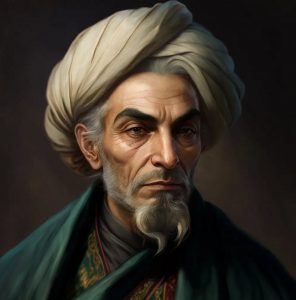
Saadi, The Iranian Poet, known for his poignant and moralistic writings
He is known for his poignant and moralistic writings, particularly his collection of poems and stories called The Bustan (The Orchard) and The Gulistan (The Rose Garden).
Saadi, whose full name was Abu-Muhammad Muslih al-Din bin Abdallah Shirazi, is one of the most celebrated Persian poets. He was born in Shiraz, Iran, in 1210 and lived during the 13th century. Saadi’s works, known for their wisdom, moral teachings, and storytelling prowess, have lasting impacted Persian literature and continue to resonate with readers across generations.
Saadi’s most famous works are the Bustan (The Orchard) and the Gulistan (The Rose Garden). The Bustan is written in prose and consists of stories and anecdotes that offer moral and ethical lessons. On the other hand, the Gulistan is written in verse and contains poems and stories exploring various aspects of human life and behavior.
Saadi’s writings emphasize ethical conduct, empathy, humility, and social justice. His works often contain tales that depict the consequences of greed, dishonesty, and arrogance while advocating for kindness, generosity, and compassion. Saadi uses storytelling to convey his moral teachings, making his works accessible and engaging for readers.
One of Saadi’s most famous quotes encapsulates his moral philosophy: “Human beings are members of a whole, in the creation of one essence and soul. If one member is afflicted with pain, other members uneasy will remain.” This quote highlights the importance of unity, empathy, and interconnectedness among human beings, reflecting Saadi’s vision of a just and harmonious society.
Saadi’s writing style is characterized by simplicity, clarity, and elegance. His verses are known for their rhythmic flow, evocative imagery, and effective use of metaphors. His works often draw inspiration from nature, weaving natural world observations with profound insights into human nature and society.
Saadi’s influence extends beyond Persian literature. His works have been translated into many languages and have significantly impacted the literary traditions of various cultures. Saadi’s ideas have also influenced other Persian poets, thinkers, and renowned writers and philosophers worldwide.
Saadi’s tomb in Shiraz is a popular destination for visitors and is a testament to his enduring legacy. His works continue to be studied, celebrated, and cherished by readers worldwide for their moral teachings, timeless wisdom, and literary brilliance.
Saadi’s ability to convey profound moral lessons through engaging storytelling and his emphasis on empathy, kindness, and social justice have made him iconic in Persian literature. His works have left an indelible mark on the literary and moral landscape, making Saadi a beloved and respected poet whose words continue to inspire and guide readers to this day.
Modern Persian Poets
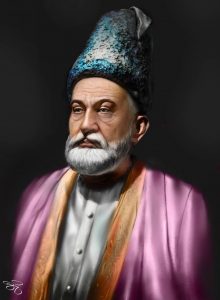
Mirza Ghalib, one of the modern Persian poets
Mirza Ghalib (1797-1869)
He was a prominent Urdu and Persian poet whose works reflect his deep introspection, melancholy, and mastery of language.
Mirza Ghalib, known as Mirza Asadullah Baig Khan, is one of Urdu and Persian literature’s most prominent and revered poets. He was born in 1797 in Agra, India, during the Mughal Empire, and lived during the 19th century. Ghalib’s poetry is renowned for its depth of emotion, profound introspection, and mastery of language.
Ghalib is considered a master of the ghazal, a poetic form consisting of rhyming couplets that express deep emotions, often centered around themes of love, loss, and the complexities of human existence. His ghazals exhibit a unique blend of wit, intellect, and emotional depth, making them relatable and thought-provoking.
Its complexity and layered meanings characterize Ghalib’s poetry. His verses often feature intricate wordplay, metaphors, and allusions to classical Persian literature, showcasing his command over language and his ability to convey complex emotions in a concise yet evocative manner. Ghalib’s poetry delves into the depths of the human psyche, exploring themes such as love, longing, spirituality, and the existential dilemmas individuals face.
Ghalib’s distinguishing features are his ability to blend the personal and the universal. His verses often reflect his experiences, struggles, and emotional anguish, yet they also touch upon universal themes that resonate with readers from diverse backgrounds. Ghalib’s poetry is deeply introspective, revealing his inner turmoil and quest for meaning in a world of uncertainty and transience.
Ghalib’s poetry reflects the changing socio-political landscape of his time. He lived during a period of political upheaval and witnessed the decline of the Mughal Empire and the advent of British colonial rule in India. Ghalib’s verses reflect his observations of the changing society, the cultural clashes, and the challenges individuals face in a changing world.
Ghalib’s poetry has profoundly influenced Urdu literature and impacted subsequent generations of poets and writers. His use of language, his exploration of complex emotions, and his ability to capture the essence of the human condition have made him an iconic figure in South Asian literature.
Ghalib’s works have been translated into multiple languages and have gained recognition and appreciation beyond the borders of Urdu-speaking regions. His influence extends to poets and writers worldwide, who have been inspired by his craftsmanship and his ability to convey the depths of human emotions.
Mirza Ghalib’s poetry continues to be celebrated and cherished for its timeless beauty, intellectual depth, and emotional resonance. His verses have become integral to South Asia’s literary and cultural fabric, captivating readers with their profound insights into love, life, and the human experience.

Nima Yooshij, the father of contemporary Persian poetry
Nima Yooshij (1895- 1960)
Nima Yushij, whose real name was Ali Esfandiari, was a pioneering figure in modern Persian poetry and is widely regarded as the father of contemporary Persian poetry. He was born on November 12, 1897, in Yush, a village in Mazandaran Province, Iran, and passed away on January 6, 1960. Nima’s innovative approach to poetry revolutionized Persian literary traditions and played a crucial role in shaping the course of Persian literature in the 20th century.
Nima Yushij’s poetry was a departure from the conventional poetic styles prevalent at the time. He sought to break away from classical Persian poetry’s rigid structures and traditional themes, introducing new forms, styles, and articles. Nima challenged Persian literature’s established norms and conventions, calling for a fresh perspective and a more authentic expression of personal and social experiences.
One of Nima’s most significant contributions to Persian poetry was his introduction of “she’r-e no” (new poetry) or “she’r-e nimaa’i” (Nimaic poetry). This new form of poetry emphasized individual expression, experimentation with language and structure, and a focus on contemporary themes and issues. Nima’s poetry embraced a more accessible and colloquial language, reflecting the changing realities of modern Iranian society.
Nima’s groundbreaking collection, “Safar-e Sang” (Journey of the Stone), published in 1921, marked a turning point in Persian poetry. The group introduced a new poetic language infused with vivid imagery, social criticism, and a deep concern for the human condition. Nima’s verses captured the struggles and aspirations of the Iranian people during a time of rapid social and political change.
Nima’s poetic vision extended beyond the realm of literature. He believed poetry had a social and transformative role in Iranian society. His works advocated for freedom of expression, social justice, and cultural renewal. Nima’s poetry celebrated the beauty of the Persian language while addressing the challenges and hopes of a modernizing nation.
Nima’s impact on Persian literature was far-reaching. He inspired a generation of poets and writers who embraced his innovative spirit and embraced new ways of poetic expression. His influence extended to subsequent movements such as the “New Wave” poets and the “Free Verse” movement.
Recognizing his contributions, the Nima Yushij Award was established in Iran in 1984. The award is presented annually to honor outstanding achievements in contemporary Persian poetry. It is considered one of the most prestigious literary awards in Iran.
Nima Yushij’s legacy as a trailblazer in Persian poetry resonates today. His emphasis on personal expression, innovation, and engagement with contemporary issues laid the foundation for the evolution of modern Persian poetry. Nima’s courage to challenge established norms and his commitment to authentic self-expression have made him an iconic figure in Persian literature and a source of inspiration for generations of poets and readers.
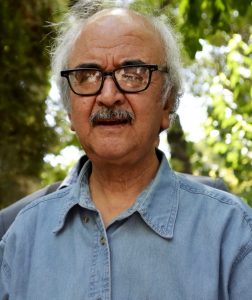
Mohammad Reza Shafiei Kadkani, a contemporary Iranian poet
Mohammad Reza Shafiei Kadkani (born 1939)
Mohammad Reza Shafiei Kadkani is a highly respected contemporary Iranian poet, literary scholar, and critic. He was born on December 29, 1939, in Kadkan village near Mashhad, Iran. Kadkani has made significant contributions to Persian literature through his thought-provoking poetry, extensive research, and critical analysis of Persian literary works.
Kadkani’s poetry deeply explores human emotions, philosophical inquiries, and reflections on life, love, and the human condition. His verses are known for their lyrical beauty, emotional intensity, and profound insights into various aspects of existence. Kadkani’s poetic style combines traditional elements of Persian poetry with modern sensibilities, creating a unique and captivating blend.
In addition to his poetic achievements, Kadkani is an eminent literary scholar and critic. He has written extensively on Persian literature, critically analyzing and interpreting classical and contemporary Persian works. Kadkani’s scholarly work is highly regarded for its depth, meticulous research, and insightful commentary.
Kadkani’s contributions to Persian literature have been recognized through numerous awards and honors. He has received the Iranian Ministry of Culture and Islamic Guidance’s Book of the Year Award several times for his critical works and poetry collections. Kadkani has also been honored with the prestigious Nima Yushij Award, a significant literary prize in Iran, for his outstanding contributions to Persian poetry.
Apart from his literary pursuits, Kadkani has held academic positions and taught at universities in Iran and abroad. He has served as a professor of Persian literature at Tehran University and Allameh Tabataba’i University, among others. Kadkani’s teachings and mentorship have profoundly influenced a generation of aspiring writers and scholars.
Kadkani’s commitment to preserving and promoting Persian literature and culture is evident in his efforts to bridge the gap between traditional and contemporary Persian poetry. He has played a crucial role in introducing Persian poetry to a wider audience and promoting dialogue and understanding between literary traditions.
Mohammad Reza Shafiei Kadkani’s poetic brilliance, scholarly contributions, and dedication to Persian literature have made him a highly influential figure in contemporary Persian literary circles. His profound insights, lyrical prowess, and academic work have earned him a place among the most esteemed and celebrated literary figures in Iran and beyond.
Forough Farrokhzad (1935-1967)
She was a groundbreaking female poet who challenged traditional norms with her raw and emotionally charged verses, exploring themes of love, identity, and freedom.
Forough Farrokhzad was an influential and groundbreaking Iranian poet, filmmaker, and feminist icon. She was born on January 5, 1935, in Tehran, Iran, and is considered one of the most significant voices in contemporary Persian literature. Farrokhzad’s work challenged societal norms, explored themes of female identity, love, and sexuality, and pushed the boundaries of poetic expression.
Farrokhzad’s poetry broke free from traditional conventions and addressed topics that were considered taboo in Iranian society at the time. Her verses were marked by their raw emotional intensity, unapologetic exploration of female desire, and honest portrayal of personal struggles and societal constraints. She defied the restrictions placed on women and fearlessly delved into her own experiences and emotions.
Farrokhzad’s first poetry collection, “The Captive,” was published in 1955 when she was just 20. The group received critical acclaim, signaling her emergence as a powerful voice in Persian literature. Her subsequent works, including “The Wall” (1956) and “Rebellion” (1958), further solidified her reputation as an influential poet.
One of Farrokhzad’s most renowned works is her “Another Birth” (1964) poetry collection. In this collection, she delved deeper into personal and social issues, challenging traditional gender roles and exploring love, loneliness, and self-discovery themes. “Another Birth” is considered a seminal work of Persian literature and a testament to Farrokhzad’s artistic and poetic genius.
Beyond her poetry, Farrokhzad also ventured into filmmaking. In 1962, she directed her only film, “The House Is Black.” The documentary, which focused on a leper colony in northern Iran, received critical acclaim and showcased her artistic vision and compassion for the marginalized. The film is hailed as a masterpiece of Iranian cinema and a testament to Farrokhzad’s creative versatility.
Farrokhzad’s bold and unconventional approach to art and exploration of themes related to female identity and sexuality challenged societal norms and earned her both admiration and controversy. Her work inspires generations of poets, feminists, and artists in Iran and beyond.
Tragically, Farrokhzad’s life was cut short when she died in a car accident on February 13, 1967, at the age of 32. However, her legacy lives on through her poetry, films, and her impact on the feminist movement in Iran. Farrokhzad’s courage to express herself authentically and address topics considered taboo at the time has solidified her status as an influential and iconic figure in Persian literature and a symbol of women’s artistic and intellectual liberation.
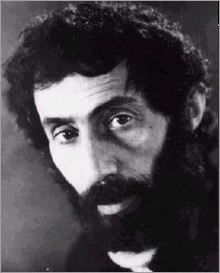
Sohrab Sepehri, famous for nature-oriented poetry
Sohrab Sepehri (1928-1980)
He is renowned for his contemplative and nature-oriented poetry reflecting the beauty of life, existence, and the relationship between humans and the natural world.
Sohrab Sepehri, born on October 7, 1928, in Kashan, Iran, was a prominent Persian poet, painter, and traveler. His work is known for its contemplative and nature-oriented themes, evoking a sense of beauty, wonder, and spirituality. Sepehri’s unique poetic style and exploration of the relationship between humans and the natural world have made him one of the most beloved and influential figures in contemporary Persian literature.
Sepehri’s poetry reflects a deep connection to nature and a profound appreciation for its beauty and serenity. His verses often depict landscapes, seasons, and elements of the natural world, immersing readers in a sensory and spiritual experience. Sepehri’s poetry encourages introspection, highlighting the importance of finding meaning and solace in nature amidst the complexities of modern life.
One of Sepehri’s most renowned poetry collections is “The Water’s Footfall” (1965), in which he captures the essence of his observations and experiences during his travels in Iran and abroad. The collection explores themes of solitude, existence, the passing of time, and the search for meaning. Sepehri’s evocative language and vivid imagery transport readers to serene landscapes and encourage a deeper contemplation of the human experience.
Sepehri’s poetry is characterized by its simplicity, clarity, and use of delicate metaphors and symbolism. His verses often employ spare, unadorned language to convey profound emotions and philosophical ideas. Sepehri’s poetic style, known as “minimalist poetry,” resonates with readers for its ability to distill complex thoughts and feelings into concise yet impactful expressions.
In addition to his poetry, Sepehri was also an accomplished painter. His paintings, often featuring elements of nature, complemented his poetic themes and further emphasized his deep connection to the natural world. Sepehri’s artistic endeavors were closely intertwined, with his poetry and painting mutually inspiring and enriching each other.
Sepehri’s work has been widely translated into various languages, bringing his poetry and artistic vision to a global audience. His influence extends beyond Persian literature, inspiring poets, artists, and readers worldwide. Sepehri’s ability to capture the ethereal beauty of nature, his introspective reflections, and his celebration of simplicity and spirituality has made him an iconic figure in contemporary Persian literature.
Sohrab Sepehri passed away on April 21, 1980, but his poetic legacy lives on. His profound insights, his ability to find solace and meaning in nature, and his contemplative verses continue to touch the hearts and minds of readers, inviting them to pause, reflect, and find comfort in the beauty of the natural world.



No comment